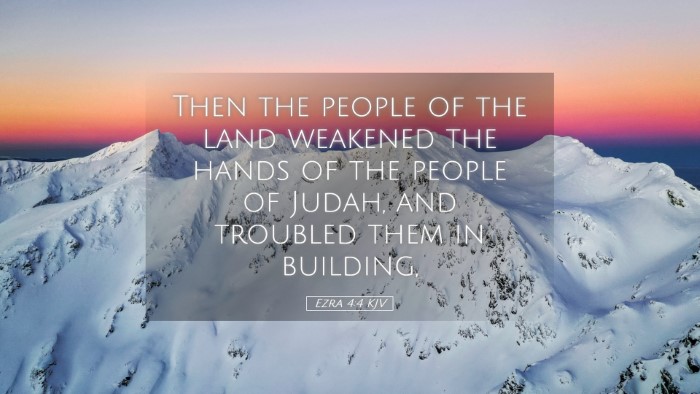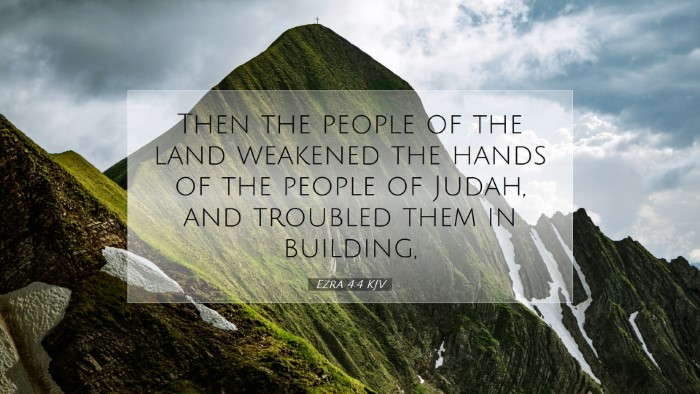Old Testament
Genesis Exodus Leviticus Numbers Deuteronomy Joshua Judges Ruth 1 Samuel 2 Samuel 1 Kings 2 Kings 1 Chronicles 2 Chronicles Ezra Nehemiah Esther Job Psalms Proverbs Ecclesiastes Song of Solomon Isaiah Jeremiah Lamentations Ezekiel Daniel Hosea Joel Amos Obadiah Jonah Micah Nahum Habakkuk Zephaniah Haggai Zechariah MalachiEzra 4:4
Ezra 4:4 KJV
Then the people of the land weakened the hands of the people of Judah, and troubled them in building,
Ezra 4:4 Bible Commentary
Commentary on Ezra 4:4
Ezra 4:4 states:
"Then the people of the land weakened the hands of the people of Judah, and troubled them in building."
Introduction
The verse Ezra 4:4 highlights a critical moment in the history of the Jewish return from exile and their efforts to rebuild Jerusalem and the Temple. It reveals the challenges faced by the returning exiles and sets the stage for understanding the opposition they encountered.
Contextual Background
The return from Babylonian captivity marks a significant chapter in Israel's history. Under the leadership of Zerubbabel and Jeshua, the Israelites began the arduous task of restoring their homeland, focusing particularly on the Temple in Jerusalem.
The Opposition Faced
Ezra 4:4 specifically indicates that the "people of the land" opposed the efforts of the Jews to rebuild. This phrase typically refers to the non-Israelite inhabitants of the region, including the Samaritans and others who had settled there during the exile.
Insights from Commentaries
Matthew Henry's Commentary
Matthew Henry emphasizes that the opposition came as a surprise and highlights the effect of this antagonism: "The people of the land weakened the hands of Judah." He notes that their efforts to intimidate the Jews were both psychological and physical, intending to sow doubt and despair among the builders.
Henry points out that this weakening of resolve serves as a reminder of the trials that come with righteous pursuits. He encourages believers to expect opposition when undertaking God's work, reinforcing the notion that spiritual endeavors may often lead to tangible challenges.
Albert Barnes' Notes on the Bible
Albert Barnes interprets the phrase "weakened the hands" as meaning to discourage, demoralize, or hinder the progress of the Jews. He shares insights on the various methods of opposition employed by these adversaries. Barnes asserts that such tactics are not uncommon when God’s people strive to fulfill His will.
Additionally, Barnes draws parallels to the modern-day faithful, urging them to remain steadfast amidst opposition. He emphasizes prayer and reliance on divine strength as critical components for believers facing similar struggles in their spiritual journeys.
Adam Clarke's Commentary
Adam Clarke observes the historical background of the period, noting that the ethnic and religious tensions between the Jews and the inhabitants of the land significantly contributed to the opposition faced by the returned exiles. Clarke points out that these tensions were not merely physical but rooted in deep-seated historical resentments.
Furthermore, Clarke suggests that the earthiness of human nature still resonates today; people often react with jealousy or hostility when witnessing the success of others. He emphasizes that this reality serves as a reminder of the necessity for perseverance and trust in God’s providence.
Spiritual Lessons and Applications
- Expectation of Opposition: Like the exiles, those engaging in spiritual endeavors should be prepared for challenges and opposition. This can take many forms, including social, financial, or mental struggles.
- The Importance of Encouragement: Spiritual builders must encourage one another, as the early exiles did, to combat the discouragements brought forth by external pressures.
- Prayer and Dependence on God: When facing opposition, believers are reminded of the power of prayer and dependence upon God. The exiles’ efforts should inspire modern-day practitioners to seek divine assistance in their endeavors.
Conclusion
Ezra 4:4 serves as a poignant reminder of the struggles that often accompany faithfulness in pursuing God’s work. The insights from the public domain commentaries of Matthew Henry, Albert Barnes, and Adam Clarke highlight not only the historical context but also the spiritual implications of opposition faced by God's people. It calls believers to be resilient, encourage one another, and rely on divine strength in the face of adversity.


